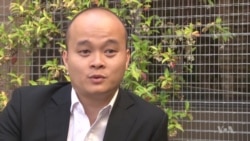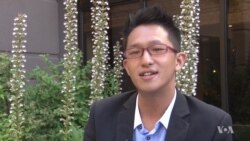Hoang Dao Xuan wanted to help kids in Vietnam who did not have an opportunity to learn English, so he drew upon his experience teaching his young daughter and created an app that now also has versions teaching French and Vietnamese. Soon it will have Spanish and Chinese, too.
The founder of Monkey Junior is one of hundreds of entrepreneurs from 170 countries taking part in the U.S.-sponsored Global Entrepreneurship Summit being held this week in Palo Alto, California.
"GES is an opportunity for us to share and to learn from each other, especially from investors, from other experience, from other entrepreneurs," he told VOA. "I actually talked to a few mentors and I actually learned a lot from them, so that's a great opportunity."
The summit launched in 2010 in Washington and returned to the U.S. this year after stops in Turkey, the United Arab Emirates, Malaysia, Morocco and Kenya.
In addition to networking with entrepreneurs from around the world, those at the summit are getting the chance to pitch their companies to investors and attend workshops and panels with business leaders and government officials.
President Barack Obama, Facebook founder Mark Zuckerberg and Google CEO Sundar Pichai are among those scheduled to speak.
From waste to cooking fuel
Jackie Yap traveled from Malaysia to attend the summit. He started a company called HiGi Energy to turn agricultural waste into cooking fuel as a cheaper and more environmentally friendly alternative to firewood and charcoal.
He told VOA that from a young age he wanted "do something crazy," and found an outlet as an entrepreneur.
"One year later I am glad that I made it here, but I want to inspire more young people to actually explore into entrepreneurship at a really young age," Yap said.
He also described the challenge that comes with collaborating with partners from different countries and cultures.
"The way you are trying to communicate with your co-founders -- for me, in my case, it's a Vietnamese co-founder and a Filipino co-founder -- is really challenging. The way we accept criticism is different, the way we actually deliver what we want to say, frankly, it's different."
Ignore the haters
His advice for potential entrepreneurs is to ignore people who are not supportive, and he says they will not regret going after something that challenges them.
"That's what I always hold within myself," he said. "You always win or you learn, you never lose. And no regrets, just do it."
Naomi Tulay-Solanke from Liberia has a similar encouraging message, especially for women entrepreneurs.
"Once we have our dream we should dream it, we should share it, we should be focused, we should be passionate about what we do," she said. "We should be able to explain our stories, especially in Africa a lot of us have this story. My story is so many women in Africa's story."
She highlighted the presence of sexual violence in her country, saying she became pregnant at age 14 and had to face stigmatism and shame while her perpetrator walked free. She said that past empowers her current efforts with her company, Community Healthcare Initiative, which aims to boost healthcare services for vulnerable women and children.
Woman in a man's world
Habiba Ali, founder of Sosai Renewable Energies in Nigeria, said she has faced number of challenges from being a woman in a male-dominated field and living in the Muslim-majority north of her country where there are certain expectations about how much a woman can be out of the house. Her business also has to deal with Nigeria's slow bureaucracy and a climate of distrust that leads to a lack of credit.
"I believe that persistence keeps me going," she said. "The fact that I know that what I'm doing is nothing bad, I'm actually doing something very good. It took me a long time to come to this realization."
Like Yap, Ali said her interest in running her own business also started early, when she realized she preferred making her own money and having the freedom to spend it.






